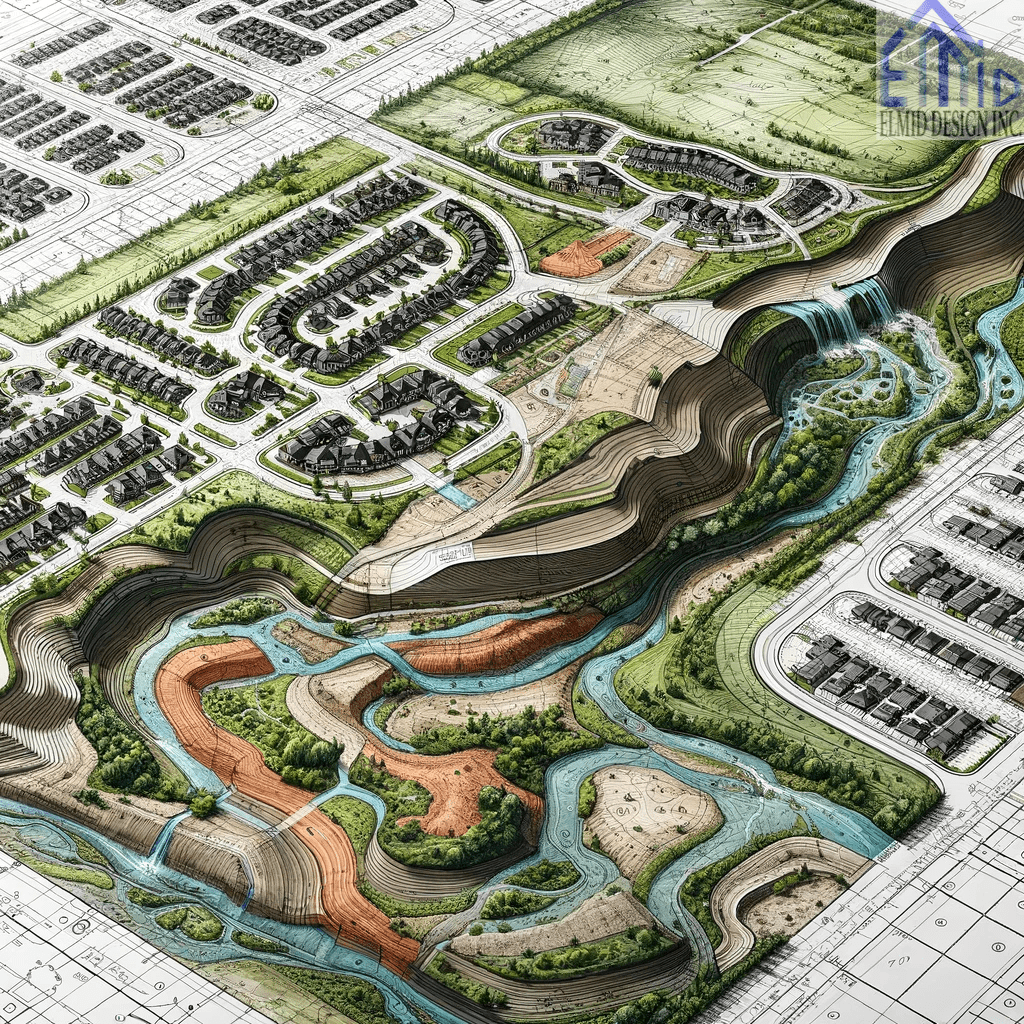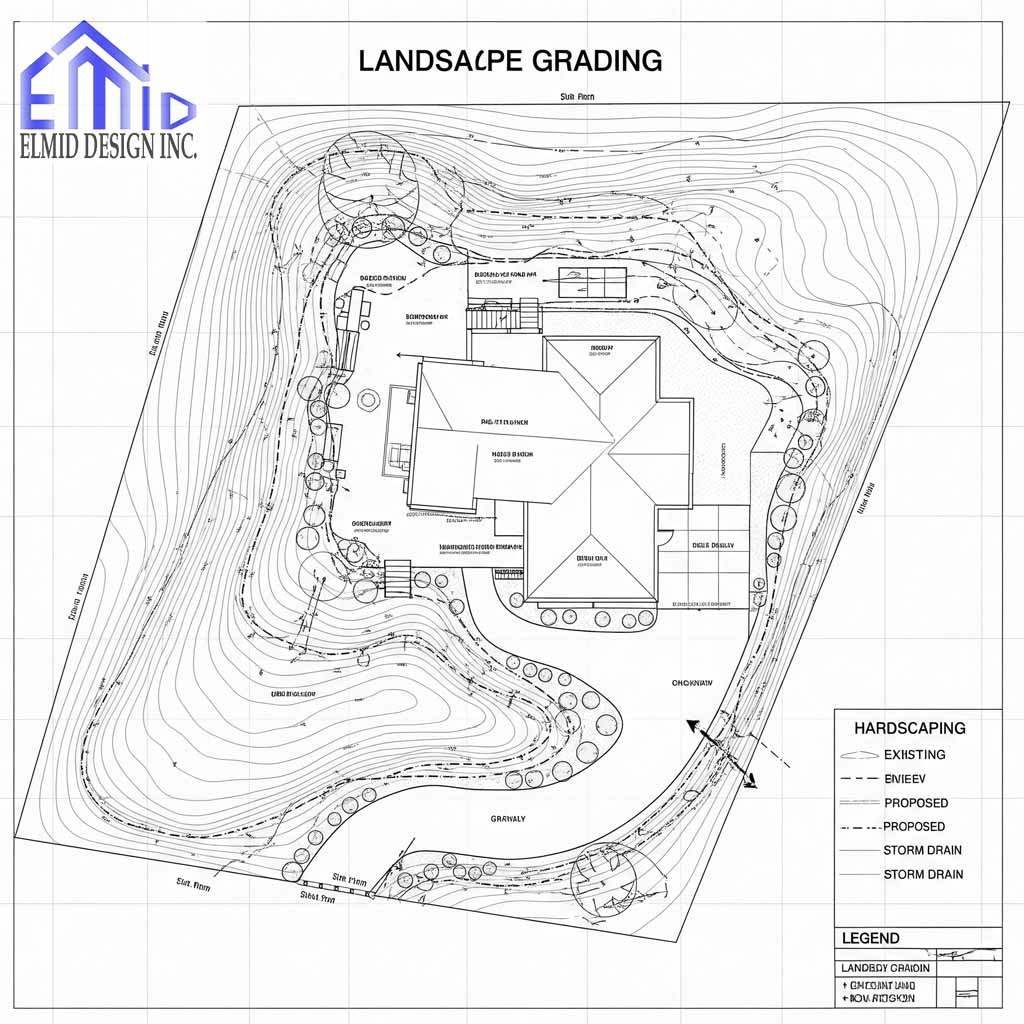A grading plan Shelburne is an essential requirement for most building and development projects in the town. It defines how land will be shaped to manage drainage, protect structures, and ensure compliance with municipal standards. Without an approved grading plan, construction permits cannot move forward, leading to delays and increased costs. The Town of Shelburne, in coordination with Dufferin County Building Services, requires grading plans as part of permit applications to ensure safety and environmental protection. These plans must show existing elevations, proposed changes, drainage patterns, and compliance with zoning rules. This article explains what a grading plan is, how Shelburne regulates submissions, what elements each plan must include, and why compliance matters. It also highlights how Elmid Design Inc, a PEO-certified engineering firm, provides accurate, permit-ready grading plans tailored to Shelburne’s specific requirements.
What Is a Grading Plan in Shelburne?
A grading plan in Shelburne is a technical drawing that outlines the existing and proposed elevations of a property. It shows how surface water will flow across the site to prevent flooding, erosion, or water infiltration into buildings. The plan typically includes swales, slopes, drainage arrows, and finished foundation elevations. Driveway gradients and landscaping integration may also be part of the design. In Shelburne, grading plans are required for new homes, additions, and site developments as part of the building permit process. They are reviewed by municipal staff to ensure that proposed changes do not negatively affect surrounding properties or natural features. Professional engineers certified by Professional Engineers Ontario are responsible for preparing these plans to guarantee accuracy and accountability. By requiring grading plans, Shelburne ensures safe, sustainable growth while protecting property owners from future drainage issues.
Shelburne’s Regulatory Framework
The Town of Shelburne enforces a strict regulatory framework for grading plans through its building permit and site plan approval processes. Applicants must submit detailed drawings that demonstrate compliance with zoning by-laws, municipal standards, and provincial building codes. Projects near environmentally sensitive areas may also require review by the Nottawasaga Valley Conservation Authority. For subdivision developments, functional servicing reports and stormwater management studies are often included alongside grading plans. Building permit checklists provided by Dufferin County Building Services highlight grading requirements as a core part of application packages. Only licensed engineers can prepare or certify grading plans, ensuring professional oversight and accountability. This framework protects both municipal infrastructure and private property by controlling water flow and preventing drainage problems. Through these regulations, Shelburne maintains orderly development while safeguarding the community against flooding, erosion, and costly disputes.
Key Components of a Shelburne Grading Plan
A grading plan Shelburne submission must include specific components for approval. Existing elevations are mapped using accurate survey data, while proposed elevations show the changes after construction. Drainage flow arrows indicate the direction of water movement, and slopes are labeled to ensure compliance with municipal standards. Swales, retaining walls, and catch basins must be shown when applicable. Driveway gradients and foundation elevations are included to prevent water infiltration. In some cases, erosion and sediment control measures are required to protect nearby waterways during construction. For subdivisions, grading plans are often linked with stormwater management facilities and functional servicing reports. A legend, north arrow, and scale provide clarity for municipal reviewers. These elements together demonstrate that the site will function properly after development. A well-prepared plan reduces the risk of rejection, delays, or costly corrections during and after construction.
Why Compliance Matters in Shelburne
Compliance with grading plan requirements in Shelburne is critical for both developers and homeowners. Non-compliant plans are returned for revision or outright rejected, delaying projects and increasing costs. If construction moves ahead without proper grading approval, long-term risks arise. Poor grading can lead to foundation damage, basement flooding, or erosion of landscaped areas. It can also cause water to flow onto neighboring properties, creating disputes and potential legal liabilities. Municipal staff carefully review grading plans to ensure that they meet zoning by-laws and environmental standards. Compliance supports sustainable development by preventing runoff pollution and reducing damage to natural ecosystems. For developers, it ensures smoother approvals and fewer costly revisions. For homeowners, it guarantees that their property remains safe, functional, and valuable for the future. In Shelburne, compliance is not optional but an essential step in the construction process.
How Elmid Design Inc Ensures Approval
Elmid Design Inc is a PEO-certified engineering firm with proven expertise in preparing grading plan Shelburne submissions. Their team understands the town’s zoning by-laws, building requirements, and conservation considerations. They prepare detailed, accurate plans that meet municipal expectations and streamline the approval process. By using advanced CAD modeling and survey integration, they ensure that every plan is both precise and practical. Elmid Design Inc also communicates directly with municipal staff to address reviewer comments quickly, reducing the need for multiple revisions. Their certification from Professional Engineers Ontario guarantees accountability and professional oversight for every project. Developers and homeowners benefit from faster approvals, reliable compliance, and long-term drainage protection. With their specialized knowledge and commitment to quality, Elmid Design Inc provides the support needed to achieve successful, permit-ready grading plans in Shelburne.
Key Takeaways
A grading plan Shelburne is a mandatory requirement for construction and development projects to ensure safe drainage and compliance with municipal rules. These plans map existing and proposed elevations, slopes, and water flow patterns to protect both private property and public infrastructure. The Town of Shelburne enforces strict guidelines through its building permit process, with additional reviews when projects are near sensitive areas. Compliance prevents flooding, structural damage, and environmental harm. Elmid Design Inc plays a vital role by delivering accurate, professional plans that pass municipal review and protect property value. Their certification, expertise, and use of modern tools make them a trusted partner for projects of any size. For anyone building in Shelburne, a grading plan is not just a permit requirement but a safeguard for long-term success.

Challenges in Shelburne Grading Plan Projects
Developers in Shelburne face several challenges when preparing grading plans. Properties near environmentally sensitive areas may require review by the Nottawasaga Valley Conservation Authority, adding time and complexity. Infill lots often need precise grading to align with established drainage systems, which leaves little margin for error. Seasonal weather patterns, including freeze-thaw cycles and heavy rainfall, complicate slope design and soil stability. Even small inaccuracies in elevation data can cause municipal rejection, forcing costly revisions. These challenges highlight the importance of professional engineering oversight. Elmid Design Inc anticipates these difficulties through accurate surveys and advanced design tools. Their approach ensures that grading plans not only meet municipal standards but also account for site-specific conditions. By addressing potential problems early, developers avoid delays and protect their investment throughout the construction process.
Case Study: Residential Addition in Shelburne
A residential addition project in Shelburne demonstrates how grading plans support permit approvals. The homeowner planned to expand their property, which required changes to the existing drainage system. Engineers revised the plan by adjusting slope elevations, adding a swale, and including erosion control measures. After resubmission, the plan received approval, and construction began without further delays. The completed project maintained proper drainage and avoided issues with neighboring properties. This case highlights the importance of detailed grading plans that consider both technical accuracy and municipal expectations. Elmid Design Inc assists clients in similar projects by preparing plans that are precise, compliant, and permit-ready. Their expertise ensures smoother approvals and safe, long-term property performance in Shelburne.
Best Practices for Developers in Shelburne
Developers in Shelburne can improve grading plan approvals by following established best practices. Accurate topographic surveys must be completed at the start to provide reliable elevation data. Drainage systems should be designed to move water safely away from foundations and toward approved outlets. Early consultation with municipal planning staff helps clarify zoning requirements and reduces the likelihood of revisions. When projects are near protected areas, coordination with the conservation authority prevents unnecessary delays. Submissions should include erosion and sediment control details to satisfy environmental standards. Elmid Design Inc applies these best practices to every project by combining technical precision with regulatory insight. Their plans align with municipal expectations while protecting property owners from long-term drainage issues. Developers who follow these methods reduce risk, improve efficiency, and achieve faster approvals for their projects in Shelburne.
Post-Construction Validation and Final Approval
In Shelburne, grading responsibilities extend beyond the approval of the plan. Once construction is complete, municipal inspectors verify that site grading matches the approved design. This process includes checking slopes, swales, and foundation elevations to ensure proper water flow. If discrepancies are discovered, developers must correct them before occupancy permits are granted. In some cases, as-built surveys or certifications from licensed engineers are required to confirm compliance. Projects near sensitive areas may also need additional review by the conservation authority. Elmid Design Inc supports clients during this stage by conducting on-site checks and preparing necessary certification documents. Their involvement ensures projects move toward completion without unnecessary delays. Post-construction validation protects property owners, safeguards community infrastructure, and guarantees that developments in Shelburne meet long-term drainage and safety standards.
Stormwater Management in Shelburne Grading Plans
Stormwater management plays a vital role in grading plan Shelburne submissions. The Town requires developers to demonstrate how rainfall and runoff will be controlled to avoid flooding or damage to municipal infrastructure. Engineers design systems that safely direct water into approved outlets, often using swales, catch basins, or retention areas. For larger projects, stormwater ponds may be necessary to handle heavy flows. Neglecting stormwater considerations often leads to rejection during municipal review. Elmid Design Inc integrates stormwater solutions into every grading plan by combining technical modeling with practical design. Their approach protects communities while also supporting environmental responsibility. Developers benefit from smoother approvals and reduced risks by addressing stormwater early in the planning process.
Zoning Impacts on Grading Plan Shelburne Projects
Zoning by-laws in Shelburne directly shape grading plan designs. Each zoning category outlines setbacks, lot coverage, and building placement, which influence how slopes and drainage patterns are developed. Residential areas require precise grading to protect adjacent homes, while commercial zones may require larger-scale stormwater solutions. Non-compliance with zoning regulations often causes plans to be rejected regardless of their technical accuracy. Their engineers review zoning rules carefully and design accordingly to prevent unnecessary revisions. This proactive method saves developers time and money by aligning projects with both municipal regulations and long-term property performance. By addressing zoning at the earliest stage, Elmid Design Inc helps developers achieve faster approvals and stable project outcomes in Shelburne.
How Grading Affects Landscaping and Property Value
Grading directly impacts property usability and value in Shelburne. Well-designed grading protects foundations, prevents flooding, and ensures soil stability for landscaping features. Homeowners benefit from level outdoor spaces that support gardens, patios, and driveways without drainage issues. Properties with effective grading maintain higher market values since buyers recognize the long-term savings from reduced maintenance costs. Poorly graded lots suffer from erosion, water pooling, and diminished appeal, which lowers resale value. Municipal inspectors also review how grading integrates with landscaping during the approval process to protect community standards. Elmid Design Inc prepares grading plans that balance technical drainage needs with attractive property design. Their work ensures homeowners enjoy functional outdoor spaces while protecting long-term property value. By combining safety with visual appeal, they deliver solutions that benefit both developers and property owners in Shelburne.
Technology’s Role in Modern Shelburne Grading Plans
Technology has revolutionized grading plan preparation in Shelburne. Engineers now use drone surveys to capture precise topographic data faster and more accurately than traditional methods. Advanced CAD and GIS platforms simulate drainage flows, slope stability, and stormwater behavior before municipal submission. These tools minimize human error, identify conflicts early, and allow for clearer communication with municipal reviewers. Accurate digital modeling shortens approval times and reduces the likelihood of costly on-site corrections. Elmid Design Inc uses these technologies to deliver transparent, reliable grading plans tailored to Shelburne’s requirements. Their combination of modern tools and engineering expertise ensures every plan meets municipal standards with precision. Developers benefit from shorter timelines, fewer revisions, and greater confidence in project success. Technology not only enhances accuracy but also builds trust between developers, municipalities, and property owners.
Conclusion
A grading plan Shelburne is the foundation of safe, compliant, and sustainable development. It ensures drainage systems work effectively, integrates stormwater management, and complies with zoning regulations. Without proper grading, projects face costly delays, disputes, and long-term risks. By preparing accurate and detailed plans, developers protect their investments and move smoothly through municipal approvals. Elmid Design Inc stands out as a trusted partner, offering PEO-certified expertise, advanced technology, and a deep understanding of Shelburne’s requirements. Their permit-ready grading plans streamline approvals, protect property value, and support long-term community stability. For projects ranging from single homes to large subdivisions, working with Elmid Design Inc ensures both immediate success and future protection. In Shelburne, grading plans are not just paperwork but a critical safeguard for responsible development.
FAQs About Grading Plan Shelburne
Why does Shelburne require grading plans?
Shelburne requires grading plans to ensure proper drainage, protect structures, and maintain compliance with municipal and environmental standards.
How does stormwater management affect grading?
Stormwater management ensures runoff flows into approved systems, reducing the risk of flooding, erosion, and environmental damage.
Who can prepare a grading plan in Shelburne?
Only licensed professional engineers certified by Professional Engineers Ontario can prepare or review grading plans for submission.
How does Elmid Design Inc assist developers in Shelburne?
Elmid Design Inc delivers accurate, permit-ready grading plans that comply with municipal rules, speed up approvals, and protect property investments.
What zoning factors influence grading in Shelburne?
Zoning determines building placement, setbacks, and lot coverage, which directly affect slope design and drainage systems.

Elmid Design Inc: Trusted Partner for Grading Plan Shelburne
Elmid Design Inc is a PEO-certified engineering firm specializing in grading plan Shelburne projects. Their team prepares precise, permit-ready designs that meet municipal drainage, zoning, and stormwater requirements. By combining advanced technology with engineering expertise, Elmid Design Inc helps developers and homeowners secure faster approvals, protect property value, and ensure long-term site safety. Their proven track record and certification make them the reliable choice for grading plan services in Shelburne.
Geographic Locations That We Service:
Our Licensed Professional Engineers specializing in Engineered Site Grading Plans offer the best-engineered site grading plan, lot grading and erosion plan, and drainage plan to obtain site plan approval and building permits in Ontario, including a wide range of municipalities. Each area boasts unique features and requirements, making our tailored approach essential for success.
Toronto and Surrounding Areas
In the vibrant heart of Ontario, we service Toronto (City of Toronto) and surrounding areas. Additionally, we cover Oshawa (City of Oshawa), Pickering (City of Pickering), and Clarington (Municipality of Clarington). Furthermore, our expertise extends to Ajax (Town of Ajax), Whitby (Town of Whitby), Brock (Township of Brock), Scugog (Township of Scugog), and Uxbridge (Township of Uxbridge).
Halton Region
Moving to the Halton Region, our services encompass Burlington (City of Burlington) and Halton Hills (Town of Halton Hills). Also included are Milton (Town of Milton) and Oakville (Town of Oakville).
Peel Region
In the Peel Region, we provide services in Brampton (City of Brampton), Mississauga (City of Mississauga), and Caledon (Town of Caledon).
York Region
Our services in the York Region cover Vaughan (City of Vaughan), Aurora (Town of Aurora), and East Gwillimbury (Town of East Gwillimbury). We also cater to Georgina (Town of Georgina), Markham (City of Markham), Newmarket (Town of Newmarket), Richmond Hill (City of Richmond Hill), Whitchurch-Stouffville (Town of Whitchurch-Stouffville), King (Township of King), and Bradford-West Gwillimbury (Town of Bradford-West Gwillimbury). Each municipality here offers a distinct setting, requiring our specialized approach.
Other Southern Ontario Cities and Towns
We also serve many other cities and towns in Southern Ontario. These include Hamilton (City of Hamilton), St. Catharines (City of St. Catharines), Niagara on the Lake (Town of Niagara on the Lake), Brant (County of Brant), Cambridge (City of Cambridge), Kitchener (City of Kitchener), Waterloo (City of Waterloo), and Woodstock (City of Woodstock). Furthermore, we operate in Guelph (City of Guelph), Centre Wellington (Township of Centre Wellington), Shelburne (Town of Shelburne), Orangeville (Town of Orangeville), New Tecumseth (Town of New Tecumseth), Essa (Town of Essa), Collingwood (Town of Collingwood), Wasaga Beach (Town of Wasaga Beach), Barrie (City of Barrie), Midland (Town of Midland), Orillia (City of Orillia), Ramara (Town of Ramara), Minden Hills (Town of Minden Hills), North Kawartha (Town of North Kawartha), Kawartha Lakes (City of Kawartha Lakes), Peterborough (City of Peterborough), Selwyn (Town of Selwyn), and Brighton (Municipality of Brighton).




